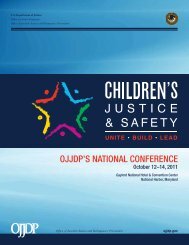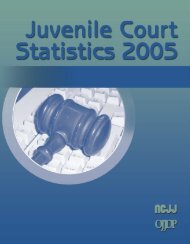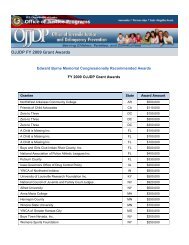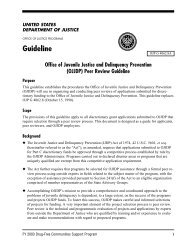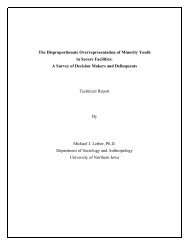OJJDP Family Listening Sessions: Executive Summary - Office of ...
OJJDP Family Listening Sessions: Executive Summary - Office of ...
OJJDP Family Listening Sessions: Executive Summary - Office of ...
Create successful ePaper yourself
Turn your PDF publications into a flip-book with our unique Google optimized e-Paper software.
Foreword<br />
From March through July 2011, the <strong>Office</strong> <strong>of</strong> Juvenile Justice and Delinquency Prevention<br />
(<strong>OJJDP</strong>), in collaboration with the Campaign for Youth Justice and the Education Development<br />
Center, convened four listening sessions with families and youth who had direct experiences<br />
with the juvenile justice system at the local and state levels. The discussions focused on four<br />
broad topic areas: the expectations and the reality <strong>of</strong> families' first encounters with the juvenile<br />
justice system, whether the youth’s needs were met during the period <strong>of</strong> confinement, how the<br />
family was treated and served while their child was confined, and the availability <strong>of</strong> aftercare<br />
services. This report presents a summary <strong>of</strong> the participants’ experiences and the many insightful<br />
recommendations for reform that they shared during the listening sessions.<br />
Many parents and guardians shared that their children exhibited early warning signs, such as<br />
truancy, a drop in grades, and evidence <strong>of</strong> mental health problems before their first detention and<br />
recommended that these warning signs serve as critical prevention and/or intervention points for<br />
youth. Other common themes raised by participants included the need for access to information<br />
regarding legal rights and representation, visitation, allowable medical supplies or treatments, and<br />
opportunities for continued education; and the importance <strong>of</strong> effective aftercare services, which help<br />
youth transition successfully back into the community and decrease the likelihood <strong>of</strong> recidivism.<br />
Senior leadership from <strong>OJJDP</strong> attended the sessions to hear the poignant and powerful testimonies<br />
directly from the families about the best and worst practices <strong>of</strong> the juvenile justice system. <strong>OJJDP</strong><br />
will use the information from these sessions to strengthen policies and activities, such as grantmaking<br />
and technical assistance, and to inform guidance to jurisdictions interested in partnering<br />
with youth and families to improve their experiences with the juvenile justice system.<br />
In addition to these listening sessions, <strong>OJJDP</strong> is undertaking further efforts to enhance youth’s<br />
and families’ experiences with the juvenile justice system. These efforts include staff development<br />
and training, presentations before key stakeholder groups (such as the Coordinating<br />
Council on Juvenile Justice and Delinquency Prevention), and inclusion <strong>of</strong> family members on<br />
specific working groups and committees to ensure that all system reform efforts include the<br />
genuine voices <strong>of</strong> youth and families.<br />
<strong>OJJDP</strong> hopes that the information the listening session participants provided will serve as a<br />
springboard for federal leaders and policymakers to influence positive changes in the juvenile<br />
justice system nationwide.<br />
Robert L. Listenbee<br />
Administrator<br />
<strong>Office</strong> <strong>of</strong> Juvenile Justice and Delinquency Prevention


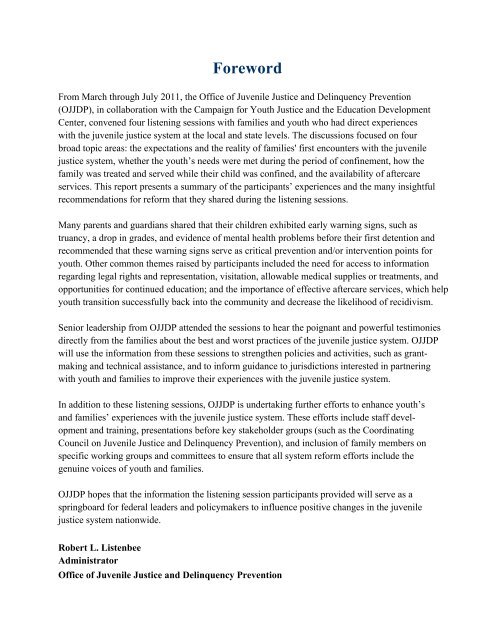
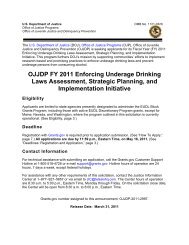
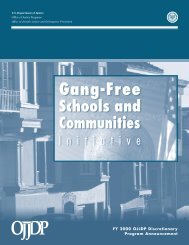
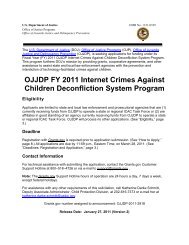
![Chapter 5 [PDF] - Office of Juvenile Justice and Delinquency ...](https://img.yumpu.com/46584340/1/190x245/chapter-5-pdf-office-of-juvenile-justice-and-delinquency-.jpg?quality=85)




